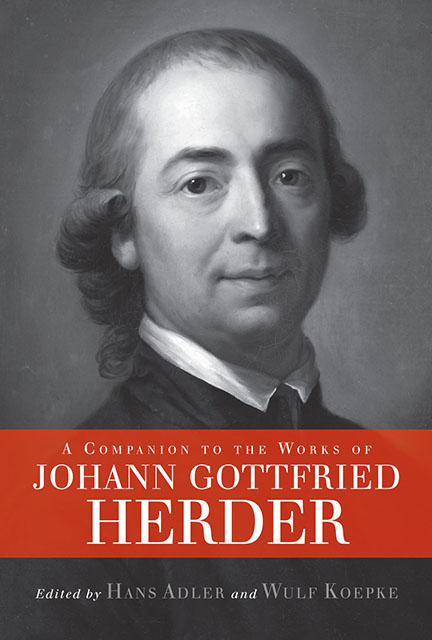Book contents
- Frontmatter
- Contents
- Acknowledgments
- List of Abbreviations
- Introduction
- 1 Herder's Life and Works
- 2 Herder's Epistemology
- 3 Herder and Historical Metanarrative: What's Philosophical about History?
- 4 Herder's Concept of Humanität
- 5 Herder and Language
- 6 Herder's Aesthetics and Poetics
- 7 Myth, Mythology, New Mythology
- 8 Particular Universals: Herder on National Literature, Popular Literature, and World Literature
- 9 Herder's Views on the Germans and Their Future Literature
- 10 Herder's Biblical Studies
- 11 Herder's Theology
- 12 Herder and Politics
- 13 Herder's Poetic Works, His Translations, and His Views on Poetry
- 14 Herder's Style
- 15 Herder as Critical Contemporary
- 16 Herder in Office: His Duties as Superintendent of Schools
- 17 Herder's Reception and Influence
- Bibliography
- Notes on the Contributors
- Index
10 - Herder's Biblical Studies
Published online by Cambridge University Press: 28 February 2023
- Frontmatter
- Contents
- Acknowledgments
- List of Abbreviations
- Introduction
- 1 Herder's Life and Works
- 2 Herder's Epistemology
- 3 Herder and Historical Metanarrative: What's Philosophical about History?
- 4 Herder's Concept of Humanität
- 5 Herder and Language
- 6 Herder's Aesthetics and Poetics
- 7 Myth, Mythology, New Mythology
- 8 Particular Universals: Herder on National Literature, Popular Literature, and World Literature
- 9 Herder's Views on the Germans and Their Future Literature
- 10 Herder's Biblical Studies
- 11 Herder's Theology
- 12 Herder and Politics
- 13 Herder's Poetic Works, His Translations, and His Views on Poetry
- 14 Herder's Style
- 15 Herder as Critical Contemporary
- 16 Herder in Office: His Duties as Superintendent of Schools
- 17 Herder's Reception and Influence
- Bibliography
- Notes on the Contributors
- Index
Summary
Preliminary Observations
HERDER'S WORK ON THE BIBLE has a distinctly theological thrust. Thus he asserted in the opening statement of his encyclopedic Briefe, das Studium der Theologie betreffend (Letters Concerning the Study of Theology) of 1780–81: “Es bleibt dabei, mein Lieber, das beste Studium der Gottesgelehrsamkeit ist Studium der Bibel” (There is no denying it, my good man, the best study of theology is the study of the Bible …). Taking this idea even further, he suggested that ideally “jeder gute Theolog sich seine Bibel selbst müßte übersetzt haben” (STh 357; every good theologian ought to have translated his Bible himself). Biblical studies must not get lost in irrelevant detail: alluding to a quotation by Basilius the Great (329–79), Herder coined the motto “theologein dei, ou philologein monon” — theological reasoning is required, not only philological reasoning (STh 416). The competent reader of the Bible — and, according to Herder, every Christian is such a reader, not just the Christian theologian (STh 367) — ought to strive for an understanding of the meaning of the words (die Wörter; Latin: verba) as well as what they refer to (die Sache; Latin: res).
This is one aspect of Herder's work on the Bible. A second, equally important aspect is his comparative view of biblical texts as literary works of art that are not lacking in stylistic and intellectual quality when compared to the writings of the classical Greek or Roman authors. Herder’s approach to the Bible, notably the Hebrew Bible or Christian Old Testament, was as much that of a literary critic as that of a theologian. Attempts to take the Bible into account in literary criticism can already be found in early manuscripts such as the essay Von der Ode or the Versuch einer Geschichte der lyrischen Dichtkunst (Essay on a History of Lyrical Poetry) as well as the so-called fragments Über die neuere Deutsche Literatur (On Recent German Literature), which otherwise focused on ancient Greek and Roman authors and the challenge their works offered for modern writers.
- Type
- Chapter
- Information
- A Companion to the Works of Johann Gottfried Herder , pp. 233 - 246Publisher: Boydell & BrewerPrint publication year: 2009



